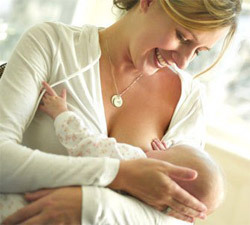The appearance of the coveted child is a great happiness and a lot of worries. Some of them are related to the peculiarities that occur in the mother's body. But most questions arise when it comes to the health and safety of the child. Months during breastfeeding are caring young mothers in connection with both problems.
What happens after giving birth
With the appearance of the baby in the female body, changes are being made aimed at satisfying the vital needs of the newborn. One of them - breast milk, for the production of which the hormone prolactin. Thanks to his active existence, the baby is full, protected from infections and feels safe. Prolactin interferes with the work of other hormones responsible for the ripening of a new egg. Thus, nature gives a woman a breather, not allowing to become pregnant for a short time. This is a short period, since the monthly ones can come quite quickly after lactation.

The timing of the onset of menstruation with breastfeeding

The more active the prolactin, the more the woman produces milk. This means that she will often feed her baby. That is, the level of prolactin will remain high for a long time, and ovulation will be suppressed. Then, and monthly for breastfeeding may be delayed for several months, and even up to a year.
With insufficient milk, the baby is fed with the formula. In such cases, menstruation during lactation can begin as early as 60 days after birth. After all, then prolactin is not enough to prevent the maturation of the egg, which is accompanied by regular bleeding.
Does menstruation affect the quality of milk?
This question weighs on inexperienced mothers who have listened to other people's stories. They believe that if the periods begin with breastfeeding, the milk acquires a different taste, loses its useful properties. And some, not wanting to "harm" the baby, try to stop feeding him with breast, thereby depriving him of protection from the aggressive external world, weakening immunity. In fact, milk remains the same, its quality depends entirely on other things, and not on the monthly. If the child is capricious these days, does not eat well, most likely, he was transferred to his mother's anxiety. It is proved that newborns are very sensitive to her mood and are acutely aware of everything that happens to the most important person in their life. And women during menstruation are often whiny or irritated.
To all adds fatigue, worry for the baby. In this aspect, breastfeeding and menstruation are only related in this way. And young mothers should not "wind" themselves. It is necessary to continue to feed the baby in the previous regime.

Important is the hygiene of the mammary glands. This is taught to all future mothers, but especially this principle is important during menstruation. Menstruation during feeding is combined with increased work of sweat glands. This makes the mother's smell not quite the usual child and becomes another reason for his poor appetite these days.
What are the monthly lactation periods for

Monthly breastfeeding should ideally be the same as before conception. But more often they become more painful, especially on their first day. And right after the appearance of the newborn, the is more abundant than usual. The peculiarity is caused by the fact that the uterus in this period of time has not yet acquired its normal size, but does not last long longer. If a woman is protected with the use of an intrauterine device, she should especially expect profuse menstruation. In addition, due to the action of prolactin in the body and continuing feeding, menstruation will not be as regular as in non-breastfed women. If a child receives breast milk every 3 hours or more, a delay is possible, even if the first monthly discharge after delivery has already arrived.
What to do if they are not present for a long time.
Women who breastfeed often, men with gv may be absent for up to a year. In this there is no pathology and contradictions, therefore, it is not necessary to specifically call them. But most mothers, according to the recommendations of doctors, introduce lure for already six-month-old children. Some milk becomes unclaimed, the index of prolactin decreases. Here, you should wait for menstruation. If it does not come, it is worth checking to see if there is a new pregnancy. Theoretically, it can not occur without menstruation. But in practice this is quite realistic. Lactation is not the most reliable way to protect yourself. And with breastfeeding in the absence of menstruation will have to look for other methods to avoid a new, unplanned pregnancy with a specialist, since ovulation can occur without menstruation.
What influences the period of arrival of menstruation when lactating
The main reason for delaying the onset of menstruation has already been mentioned - this is the frequency of feeding, high levels of prolactin. There are other, less natural causes. These include:
- Severe pregnancy and childbirth. Monthly can not be renewed with breastfeeding even if it is combined with artificial. The weakened organism is more slowly restored, all the processes in it are also inhibited;
- Complications in the puerperium.
Both cases are able to increase the period of arrival of monthly for 2-3 months.
Nature decided that it was the mother and her milk that became the main protection for the newborn. Breastfeeding and menstruation, which 80% of women begin in this period, are quite compatible. After prolactin affects the production of milk immediately after the birth of a child, and then its volume depends on the amount that the baby consumes. If the menstruation interfered with this process, the baby would stop taking the breast. But this does not happen, therefore, the mother's task is to feed him, as long as it is necessary to preserve health and form a stable immunity to the baby.
